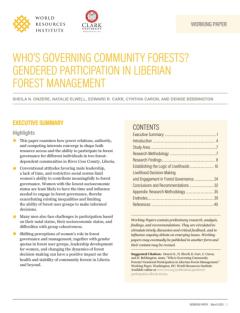
Across sub-Saharan Africa, women play an important role in managing the forests that support their lives, livelihoods, and households. Yet they are often excluded from decision-making processes affecting these natural resources. As many African countries take steps to decentralise natural resource management and strengthen local forest governance mechanisms, it is critical to understand the barriers that women face when they try to engage in forest management. Doing so can help ensure that decisions made at both national and community levels protect women’s access to forest resources as well as benefit from their wisdom on sustainable management.
This paper examines how power relations, authority, and competing interests converge to shape both resource access as well as individual community members’ ability to participate in forest management. It identifies patterns of engagement in forest governance, explains these trends, and highlights pathways through which women’s participation in managing these ecosystems may be improved. Field research, conducted in collaboration with Clark University and the Foundation for Community Initiatives (FCI) in Liberia, finds that women’s livelihoods and the sustainability of forest resources would greatly benefit from women’s participation in local decision-making processes. Women, for example, often possess unique knowledge and skills that can help improve forest management, because they tend to use different forest resources than men. However, significant regulatory and social changes are needed to achieve this goal. This paper finds that a deeper understanding of local power relations and social dynamics must underpin efforts to foster gender and social equity. Such an analysis can also help decision-makers avoid risks to already vulnerable people and the forest resources on which they depend.
